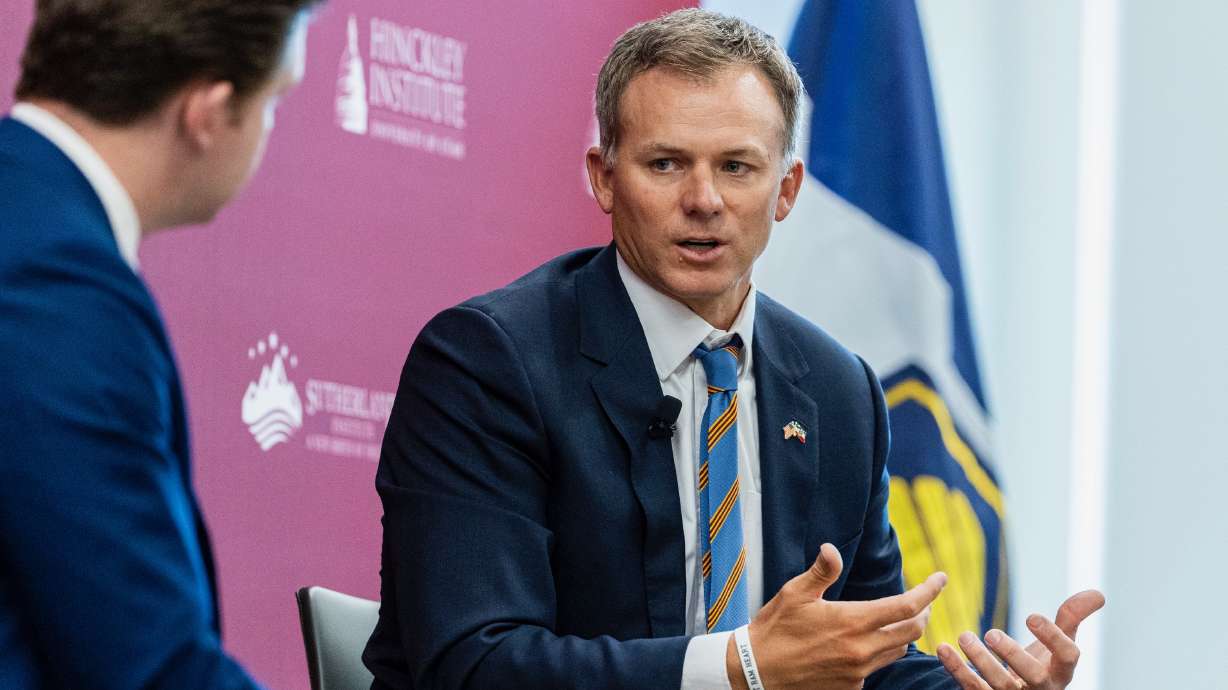Estimated read time: 4-5 minutes
- Rep. Blake Moore offered pushback to President Donald Trump on tariffs and in the Kilmar Abrego Garcia case.
- The Republican lawmaker told constituents he is leery of too much of an emphasis on tariffs in trade policy.
- Moore said he thinks Trump should abide by the Supreme Court pronouncement in the Abrego case.
WASHINGTON — U.S. Rep. Blake Moore offered a measure of pushback to President Donald Trump on immigration and tariffs during a telephone town hall gathering with constituents Tuesday night.
Increased tariffs on foreign goods will lead to price increases for U.S. consumers, he said, adding that "we are pushing back and working with the administration" on the issue.
"This is something that has not been difficult for me to speak in opposition to, some of the decisions that are being made at the administration level," said Moore, a Republican who represents Utah's 1st District.
On immigration, he said the Trump administration should abide by the U.S. Supreme Court order to facilitate the return of Kilmar Abrego Garcia, a migrant living in Maryland who was deported last month to El Salvador despite a prior court ruling against such action. The administration has said it doesn't intend to pursue Abrego's return.
Moore's telephone town hall on Tuesday lasted around an hour, with the lawmaker taking several questions from callers. Immigration and tariffs were among the key topics discussed.
On trade, Moore said the United States is getting taken advantage of on a global scale via "nontariff barriers," but Trump's emphasis on tariffs is more pertinent to the imbalance of U.S. trade with other nations. That imbalance, he went on, is indicative of U.S. economic might and buying power, not necessarily a bad thing. Among other measures, Trump implemented a 10% minimum tariff on most countries effective April 5 and has been particularly vocal in placing tariffs on Chinese goods.
Moore, too, favors action on "the China piece," but any action has to be "more targeted and more specific to certain industries," he said. "Otherwise, we're going to see a mass increase in prices across the country."
He spoke favorably of talk among some in Congress of legislation limiting the president's ability to implement tariffs. However, since Trump would have to sign such a bill into law if it made it to his desk, the legislative effort, he argues, would only serve "as a show of strength" of people willing to push back.
"This is not being antagonistic to the administration. This is me being respectful to my Article 1 duty," he said, alluding to the provision of the U.S. Constitution granting Congress lawmaking powers. "For whatever reason, over time, we've not only given that power, we've lost that power."
'Heavy amount of executive orders'
On immigration, he would like to see more legislative action as opposed to executive orders, pointing to the Laken Riley Act, passed by Congress and signed into law in January by Trump. The measure, spurred by the 2024 killing of Laken Riley in Georgia by a Venezuelan man who entered the country illegally, requires the Department of Homeland Security to detain certain immigrants arrested for burglary, theft and other related crimes.
"It was like that moment of, 'My goodness, this is the way ... our republic is supposed to work.' But there's been, obviously, a heavy amount of executive orders," Moore said.
The congressman called the decline in encounters at the U.S.-Mexico border a key win in Trump's moves to stem illegal immigration. On the flip side, he referenced the stalemate between the U.S. Supreme Court's order to return Abrego to the U.S. and the Trump administration's failure to do so.
"They made a mistake in one of the deportations, and the Supreme Court weighed in. There should be an honoring of the Supreme Court by saying this individual needs to be brought back and put through the process. That is something I clearly agree with," Moore said. By doing so, he went on, he thinks the Trump administration could garner broader support in his efforts to combat illegal immigration.
Though a heated, controversial topic, Moore doesn't see the Abrego issue evolving into a debate about whether Trump should be impeached. "This is not something that is going to become an impeachment discussion," he said.
The nation needs to curb illegal immigration, Moore said, and he backs efforts to do so, saying, "I think that by doing it more aligned with the due process, we're going to have a much better outcome."









